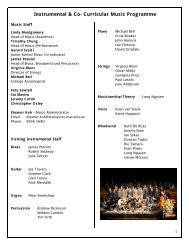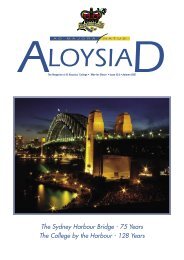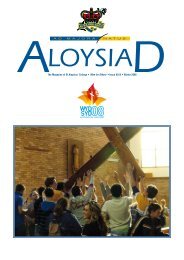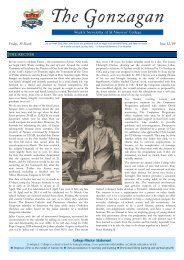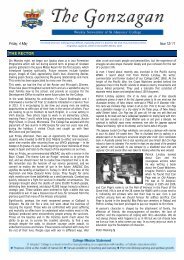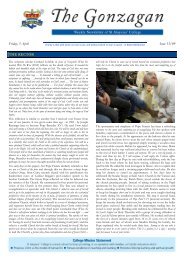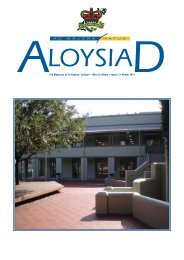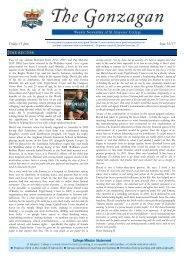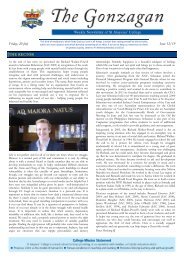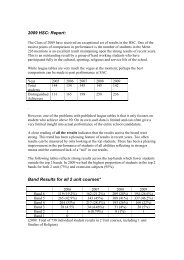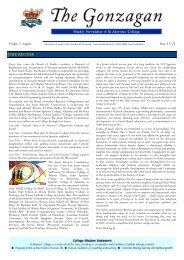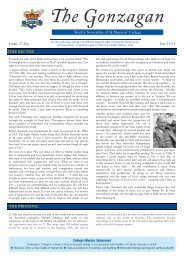Aloysiad 15-12 2006.indd - St Aloysius
Aloysiad 15-12 2006.indd - St Aloysius
Aloysiad 15-12 2006.indd - St Aloysius
You also want an ePaper? Increase the reach of your titles
YUMPU automatically turns print PDFs into web optimized ePapers that Google loves.
from the principal<br />
Discipline<br />
In 1925 a young American was studying physics at<br />
Cambridge University. A bad year, including a struggle<br />
with depression and frustration with practical work in the<br />
laboratory, culminated in an incident that threatened his<br />
career. He gave an apple coated in noxious chemicals<br />
to his tutor. Fortunately the apple was not eaten, but the<br />
student was discovered. And the venerable University’s<br />
punishment? He was placed on probation and sent to<br />
sessions with a psychiatrist!<br />
The New Yorker magazine leads with this story in an<br />
article on discipline in schools today. The point of the<br />
article is made through the fate of the American student,<br />
who today, no doubt, would have been expelled. Back<br />
in 1925 his teachers at Cambridge weren’t sure that the<br />
benefits of enforcing the law, in this case, were greater<br />
than the benefits of allowing the offender an unimpeded<br />
future. They considered the individual circumstance, and<br />
they acted accordingly. That student went on to change the<br />
face of science through his work in quantum physics. We<br />
know him as Professor Robert Oppenheimer, the scientist<br />
entrusted with the most critical and morally charged project<br />
in the history of science, the Manhattan project, and the<br />
development of the A-bomb. Oppenheimer later became<br />
one of the great thinkers about science and morality, and<br />
was a voice against the proliferation of nuclear weapons.<br />
The Oppenheimer story relates to the magazine’s critique<br />
of zero tolerance as the answer to the challenge of discipline<br />
in schools. It cites a US study that finds that the frequency of<br />
targeted offences in schools soared after a zero tolerance<br />
policy was applied. More fundamentally, the article<br />
advocates the historical practice in education of being<br />
able to administer discipline with discretion. The argument<br />
is that every case is different, and that, more importantly,<br />
every offender is different. It is an argument that resonates<br />
with me. Often when we know a boy better, knowing<br />
his context and reaching an understanding of the various<br />
pressures in his life, then matters of discipline become far<br />
less black and white. Indeed a maxim might be stated that<br />
the better our pastoral care the more<br />
nuanced must be our discipline<br />
procedures. A distinction can be<br />
drawn between acting ‘fairly’<br />
and acting ‘justly’ in dealing<br />
with boys in trouble. Fairly is when<br />
everyone is treated exactly the<br />
same, and this is the least that can<br />
be asked of any system of discipline.<br />
Acting justly is when you take<br />
other significant<br />
factors into<br />
consideration<br />
before acting,<br />
and this is a<br />
more exacting<br />
standard.<br />
It is fair to say that there is pressure at times from parents<br />
and staff, and even boys, for what is termed more clear-cut<br />
and punitive action: consequently, a more discretionary,<br />
individual based approach is somewhat out of favour. The<br />
New Yorker laments that “to acknowledge that the causes<br />
of our actions are complex and muddy seems permissive,<br />
and permissiveness is the hallmark of an ideology now<br />
firmly in disgrace.” Unusually for a secular magazine, it<br />
goes further with a religious analogy, “that conservative<br />
patron saint Whittaker Chambers once defined liberalism<br />
as Christ without the Crucifixion. But punishment without<br />
the possibility of redemption is worse: it is the crucifixion<br />
without Christ”. There is always a challenge in maintaining<br />
a balance between a structured learning environment<br />
with clear boundaries and a model of education that is<br />
formation-based and relational in nature.<br />
Other factors are also relevant in framing an approach<br />
to a discipline policy. We are preparing our students for a<br />
world in which authority generally must be earned rather<br />
than simply given by virtue of the power or office one holds.<br />
The Church itself has struggled to come to terms with this<br />
mindset, and it is important that a Church institution is less,<br />
rather than more heavy handed, in the exercise of authority.<br />
To a certain extent we should welcome the questioning<br />
student, while also demanding the responsibility that<br />
comes with questioning. Jesuit schools have always had a<br />
tradition of producing enquiring students, and some such<br />
as Voltaire of Castro have travelled a very different road<br />
from one we might wish for them. Nevertheless the gift<br />
from God of an enquiring intellect is never one we should<br />
turn our backs on.<br />
We live in a world, moreover, where personal<br />
responsibility plays an ever-increasing role, given that many<br />
of the traditional structures of authority have eroded. Ideally,<br />
the school community should model both the development<br />
of personal responsibility and the exercise of authority in<br />
a way that better prepares our students for the future. The<br />
example set by adults is a more powerful force than any<br />
other in forming the character of the young person for<br />
today’s world. Put bluntly, the day is gone when a school<br />
can simply ask parents to butt out and leave the business of<br />
education to the school. The day is gone when the word<br />
of a Head is law, and staff act accordingly. And the day<br />
is gone when student behaviour can be modified solely by<br />
the exercise of authority from above. The claim may be<br />
made that parents run the school or teachers run the place<br />
or that students run the place! And in a sense this is exactly<br />
as it should be! Today’s education should be a work of<br />
collaboration, as frustrating as it sometimes becomes. Yet<br />
all of us from time to time pine for a simpler time when<br />
things could be done be a simple authoritative command,<br />
though I’m not sure such a time really ever existed beneath<br />
superficial appearances.<br />
There is a criticism that a more collaborative approach<br />
to discipline is too soft and may represent an abdication<br />
of authority. To my mind, however, collaboration is more<br />
<strong>St</strong> <strong>Aloysius</strong>’ College<br />
A Jesuit School for Boys _ Founded 1879 a l o y s i a d / p a g e 4



